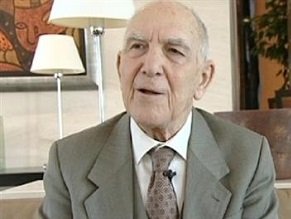|
World Jewish News

Stephane Hessel not only espoused unpopular views on the Israeli government and continued settlement policy, but also uniquely contended that European media was “totally in thrall to Israeli propaganda
|
Hollande leads tributes to ‘a great figure’ and resistance fighter
01.03.2013, Israel and the World French President Francois Hollande led tributes to German-born French resistance fighter Stephane Hessel, who died in Paris Wednesday, aged 95.
He heralded him as “a great figure whose life was exceptionally devoted to the defence of human dignity”.
Invoking German-born Hessel’s refusal to serve in the French army under the Nazi collusionist Vichy administration, after migrating to the Republic and assuming citizenship, which led him to join with Charles De Gaulle’s resistance fighters, Hollande said his “capacity for indignation knew no bounds, except for his own life. As it ends, it leaves us with a lesson not to resign ourselves to any injustice”.
The indignation invoked by the French President extended into later life, when Hessel became a fierce critic of successive Israeli administrations, who he last year accused, in an interview with Israeli daily Ha’aretz of “making two big mistakes: occupation and settlement in the territories”.
This outspoken anti-Zionist rhetoric, he insisted, was prompted not by any special affinity to the Palestinians or Arabs, but by a Holocaust survivor’s sense of responsibility to the Jewish State, having seen “firsthand the Jews’ suffering. It is that obligation which makes me write that Israel must be led differently to ensure its security,” he added.
His vehement criticism of Israel however made him unpopular with many Jewish groups, as Richard Prasquier, President of CRIF, the umbrella group of French Jewry, who said in a statement following the news of Hessel’s death: “It is well-known that we were very much opposed to his position, including his obsessive to make Gaza the epicentre of injustice in this world and to characterise the Hamas movement peaceful, almost socially-minded, despite its difference to human tragedies and mass crimes taking place today in general silence.”
Acknowledging however “the role he played in several important events in our history”, Prasquier concluded that “on this, the day of his death, we remember him as a brave resistance fighter a modest but genuine contributor to the struggle for human rights and a passionate lover of French literature”.
Whilst serving the French resistance, Hessel was captured by the Gestapo in 1940 and deported to the Buchenwald concentration camp. From there, he managed to escape, having exchanged identities with a sick prisoner and fleeing guards during a prisoner transfer to Bergen-Belsen, eventually returning to Pairs after liberation by allied forces. As he noted in his memoir Dance with the Century, the UN was established just a year after his escape from Buchenwald, an organisation that would play an important part in his post-war legacy.
After WWII, Hessel began a distinguished career with the French foreign ministry, which soon saw him play a part in penning the UN’s Universal Declaration of Human Rights. “We, members of the general secretariat, felt our hearts skip a beat when the president of the assembly called for a vote,” he later wrote of this period. “Would the Soviet Union vote against it or abstain? What would Saudi Arabia do? The president announces: 43 in favour, none against, eight abstentions. It was probably one of the most emotional moments of my life.”
Hessel was a firm supporter of 2011’s social-justice protests in Israel over housing costs, which he equated to the popular uprisings across the Arab World of the same year. However, he later turned his back on the proponents of the protests for not reaching his own conclusions that the real reason for their predicament was “the fact that their government is wasting so much money on the occupation and the settlements”, without which he contended, their quality of life would inevitably be better.
A one-time visitor to Israel, pre-1967, where his daughter also volunteered on a Kibbutz, he said of Israel’s victory in the Six-Day war: “I always say that when a country wins with such overwhelming might, it’s bad news for that country.”
A firm advocate of a two state solution, he rejected Israel’s arguments for defending its security, contending that “as long as Palestinian violence exists, but not a Palestinian state, Israel is in danger, because it cannot obtain assistance from the international community against an entity that is not subordinate to international law”.
Hessel not only espoused unpopular views on the Israeli government and continued settlement policy, but also uniquely contended that European media was “totally in thrall to Israeli propaganda”. “Europe is not lifting a finger to prevent Israel from continuing to behave as it is now. Israeli propaganda in Europe, France and the United States is far more effective than any other,” he told Haaretz.
In October 2010, he reached a wider modern audience with the publication a rousing 4,000-word booklet ‘Indignez-vous!’ (‘Time for Outrage!’) calling on today’s youth to emulate the spirit of his generation’s WWII resistance to global injustice. A popular success, selling three million copies in Europe in less than a year, it was translated into more than a dozen languages and became a symbol of the Occupy Wall Street protests against financial greed.
by: Shari Ryness
EJP
|
|
